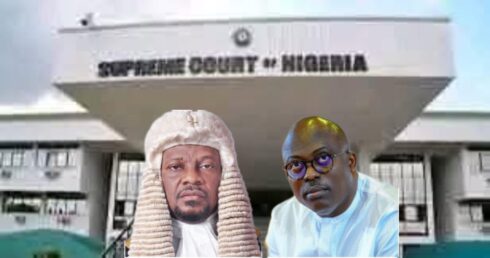The Supreme Court of Nigeria has issued a landmark ruling preventing the Central Bank of Nigeria (CBN), the Accountant General of the Federation, and other financial institutions from disbursing funds to the Rivers State government. This ruling, delivered by Justice Emmanuel Akomaye, follows what the court described as “flagrant disobedience to court orders” by Governor Siminalayi Fubara.
The supreme court criticized Governor Fubara for presenting and implementing the state’s 2024 budget with a four-member House of Assembly, sidelining twenty-eight other elected legislators. The justices unanimously agreed that this move was unconstitutional and undermined democratic governance in the state. The ruling will remain in effect until a properly constituted legislative assembly, inclusive of all elected members, passes a legitimate appropriation bill.
Justice Akomaye noted that the Rivers State government had persistently disregarded judicial decisions, particularly concerning the status of the House of Assembly. The supreme court’s verdict aligns with an earlier Federal High Court decision that declared Fubara’s 2024 budget approval as illegal due to the irregularity in legislative composition.
Supreme Court Mandates Full Legislative Assembly Resumption
In addition to freezing Rivers State’s federal allocations, the Supreme Court reaffirmed the legitimacy of the Martin Amaewhule-led House of Assembly. The court dismissed Governor Fubara’s cross-appeal that sought to challenge the Assembly’s legitimacy, declaring it meritless.
The ruling mandates Speaker Amaewhule and all duly elected members of the Rivers State House of Assembly to resume legislative sittings without further obstruction. The supreme court emphasized that the legislature’s role in governance is indispensable and cannot be unilaterally undermined by executive actions.
Governor Fubara’s decision to present the state budget before a four-member Assembly was condemned as an “act of brigandage and dictatorship” by the Supreme Court. The justices further criticized the demolition of the state House of Assembly complex, describing it as an abuse of executive power intended to frustrate legislative functions. The ruling restores full legislative authority to the Assembly under Amaewhule’s leadership.
Background: Political Crisis and Legislative Rift
The Rivers State political crisis began in late 2023 when twenty-seven members of the House of Assembly, led by Speaker Martin Amaewhule, defected from the People’s Democratic Party (PDP) to the All Progressives Congress (APC). This shift triggered a fierce political battle between Governor Fubara and the legislature, with the governor refusing to recognize the defected lawmakers.
In response, Governor Fubara presented the 2024 budget to a smaller, four-member faction of legislators loyal to him, excluding the majority faction led by Amaewhule. The governor subsequently dismissed all the twenty-seven defected lawmakers, an action that was challenged in court.
The crisis escalated further when Fubara approved the demolition of the Rivers State House of Assembly complex, forcing lawmakers to hold sittings in alternative locations. His administration’s attempt to push forward governance without the majority Assembly members led to multiple legal battles, culminating in the Supreme Court’s intervention.
Local Government Elections Declared Invalid
In a related ruling, the Supreme Court also nullified the local government elections conducted by the Rivers State Independent Electoral Commission on October 5, 2024. The judgment, delivered by Justice Jamilu Tukur, declared the elections void due to gross violations of the Electoral Act.
Justice Tukur noted that the electoral body failed to comply with proper procedures, including the continued voter registration after the election date was announced. The court ruled that the election process was rushed and did not meet the legal standards required under Section 150 of the Electoral Act.
As a result of this judgment, all local government chairmen elected in the controversial poll have been removed from office, further deepening the political instability in Rivers State. The ruling has sparked reactions from various political stakeholders, with calls for a fresh, lawfully conducted local government election.
Legal Implications and Next Steps for Rivers State
The Supreme Court’s ruling marks a turning point in the ongoing political crisis in Rivers State. The immediate impact of the judgment is the financial freeze on the state government, which could stall key development projects and governance operations.
Governor Fubara must now navigate a complex legal and political landscape. The court’s directive makes it mandatory for him to recognize the Amaewhule-led Assembly and re-present the 2024 appropriation bill to the full legislative house. Failure to comply could lead to further legal sanctions and prolonged financial restrictions.
Political analysts argue that the ruling reinforces the supremacy of constitutional governance in Nigeria, ensuring that no executive action can override the principle of separation of powers. However, the decision also heightens tensions in Rivers State, with potential consequences for the state’s political stability ahead of future elections.
The Supreme Court’s intervention underscores the judiciary’s role in upholding the rule of law and preventing the abuse of executive authority. As Rivers State adjusts to these new legal realities, all eyes remain on Governor Fubara’s next move in resolving the political deadlock.
Table of Contents
Discover more from OGM News NG
Subscribe to get the latest posts sent to your email.














